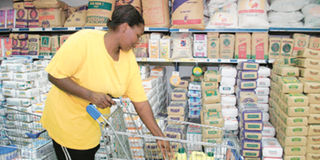Maize millers face shortage as State seeks 6 million bags

A shopper buys maize meal at a supermarket. Prices of maize products may go up due to a maize shortages. Photo/FILE
Bulk supply of maize in the market is growing tight as millers cry foul over failure to procure enough from the government.
There is a high possibility of a price surge for new maize products ahead of the festive season, a situation that could reverse the trend towards falling inflation.
Unga Group, the market leader, for now retains a recommended retail price of Sh87 for its two-kilo maize meal packet.
There is increasing disquiet from a section of the millers over what they term an emergence of brokers through whom they are forced to go when securing maize from government stores.
Some millers claim brokers are making a huge killing as they flog maize acquired from the National Cereals and Produce Board (NCPB) with a 26 percent mark-up.
But, according to Agriculture permanent secretary Dr Romano Kiome, the board has stopped selling to millers as it fights to shore up reserves of the staple commodity from a low 1.8 million bags to 6 million bags.
The government seems to have ditched the Bretton Woods prescription that it maintain only commercial stocks of grain even as countries like Japan go full blast in the opposite direction.
“There is no maize at the moment. NCPB told us to wait for some allocations this week, but this did not happen,” said executive director of Cereal Millers Association Paloma Fernandes.
She, however, said she was not aware of brokers receiving the food staple as no one seemed to have any stocks.
Brokers are reported to be buying maize at Sh1,910 and selling it to millers at Sh2,450-Sh2,470. NCPB secures billions of shillings from Treasury to buy grain in the market, mainly to cushion farmers and consumers.
The grain is being secured through currency-distorting imports after politically instigated clashes early this year disrupted planting, and in many cases, destroyed harvested maize.
Last week NCPB communications manager Kipserem Maritim told the Sunday Nation that they had not received complaints from any miller even as some of them continued to queue at the Industrial Area depot.
“We have a register of millers and institutions. We prioritise them in that order, and none of them has been denied maize,” he said. But sources said complaints had been lodged with Dr Kiome by millers. He now says the government has stopped selling maize as it seeks to build strategic reserves.
“Ours is strategic reserves. You cannot sell what you are reserving,” he said on phone from Kakamega. He added that millers should go to the ground to secure supply as farmers are already harvesting in the area and in the North Rift.
An official of giant miller Unga confirmed the shortage and said most millers have camped in the North Rift. But, according to Dr Kiome, most farmers are reluctant to sell at this point until their school fees payments are due; the reason is to prevent men from raiding the family till to finance leisure.
Despite the PS denying that brokers receive preference, one of the millers officially complained over a month ago about the same. We learnt that some large operators have been dealing with powerful brokers for sometime now.
A letter written by breakfast cereals giant Proctor & Allan (East Africa) to the managing director of the NCPB notes that despite the use of public funds in purchasing maize, the board was denying them the commodity.
“We write with regard to our letter dated October 16, 2008 requesting for approval to purchase some 5,000 bags of maize. We have made several visits to follow up on the same with no success,” says a letter written by production manager Z Muli, seen by the Sunday Nation.
Food relief
The company, which also produces domestic flour used for making porridge in the low-income urban areas, says some of the customers to whom the extra cost is to be passed on are already targets for food relief.
Mr Maritim said the mandate of the board is to ensure availability of food to Kenyans, which it is fulfilling. However, we reliably learnt that the complaint was received on October 31 by NCPB but, as we went to press, the parastatal was yet to respond to the letter.
“We therefore request your intervention and grant us approval for purchase of 10,000 bags of maize,” the firm wrote as its deficit rose.
“Between January and August this year, we have purchased 1,685 tonnes of maize directly from you and we cannot understand the rationale of forcing us to buy from middlemen,” Proctor & Allan wrote to the NCPB boss.
Mr Maritim admitted that the board is controlling the flow of maize and suggested that millers would want to stockpile as much as possible as the situation remains unpredictable.
While still insisting they have a list of millers (who are never denied maize), on the brokers he said: “There are people who go to millers and offer to buy for them. It is obvious someone would want to cash in.”
Rent seeking
Clearly, whatever explanation is offered for the existence of brokers, it is hard to fathom why huge millers with procurement departments would want to engage middlemen. It obviously creates room for rent-seeking. Dr Kiome, nevertheless, insisted no one was getting the maize.
If NCPB continues to withhold maize, and the farmers don’t release theirs--if indeed they have significant stocks--Kenyans will be in for a holiday shock.
Luckily, wheat production globally is on the rise, which may offer some reprieve to consumers.
For millers faced with high fuel, road infrastructure and electricity costs, it might be a matter of time before they respond to the scarcity in core raw material. In the meanwhile, they find it hard to comprehend the short supply.




